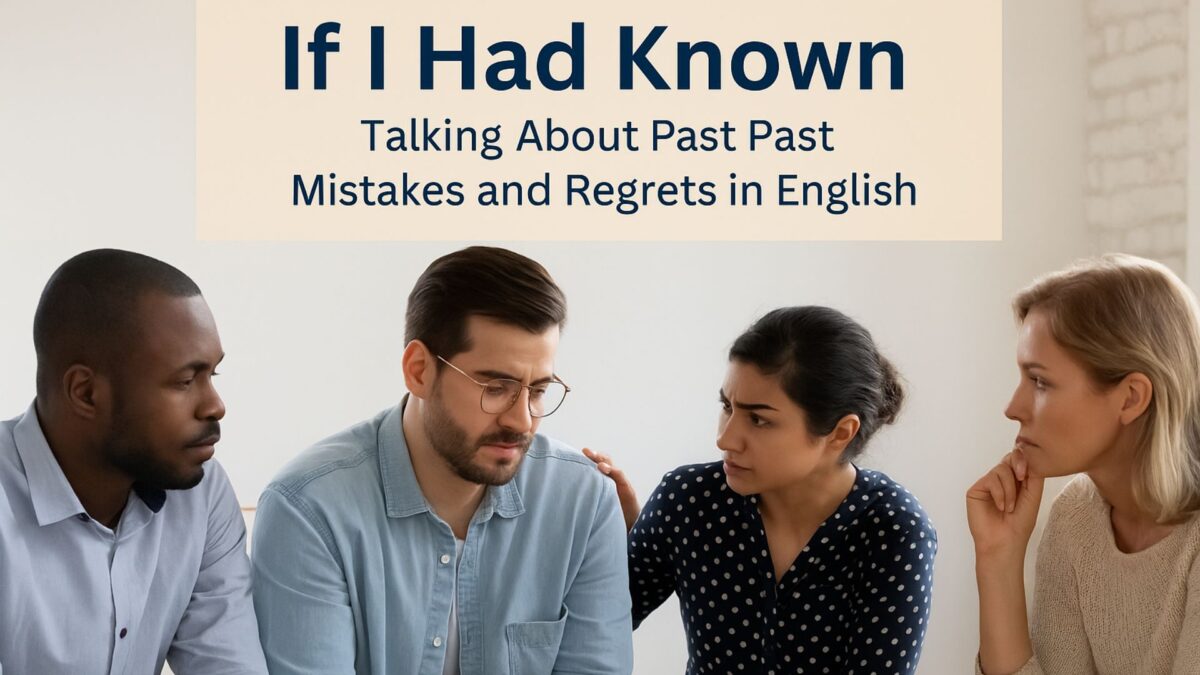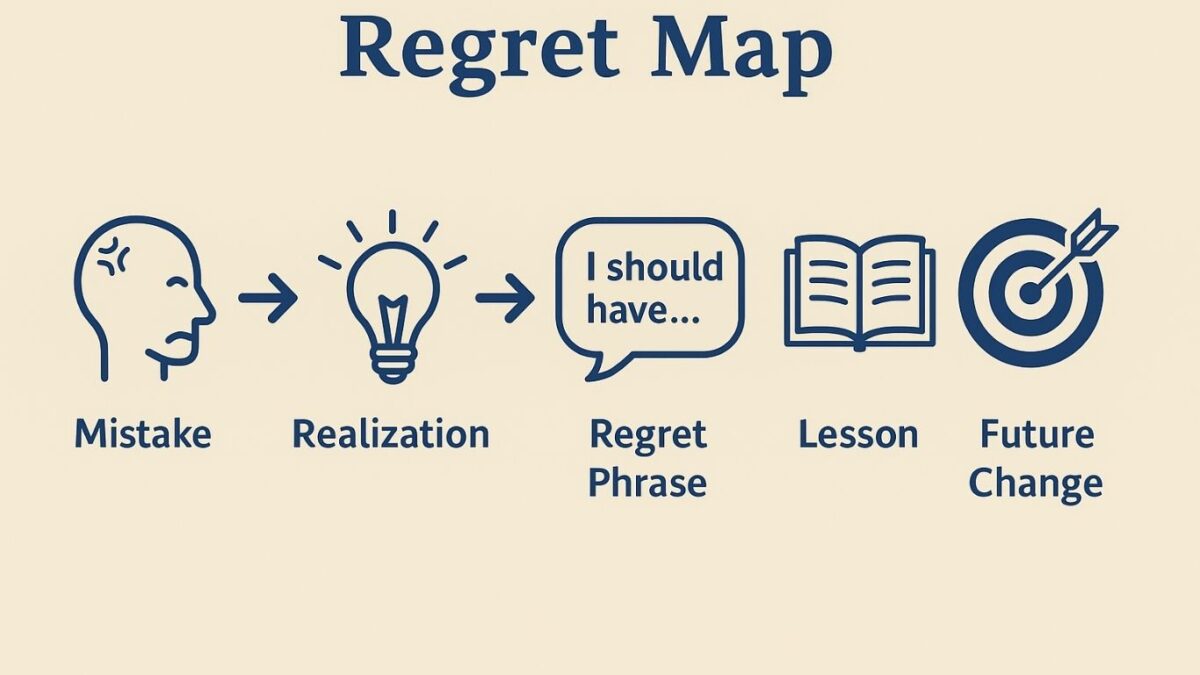Learn to express past regrets in English using modals like should have and could have through grammar, conversation, and music.

Guess what? When you click and buy through our links, you’re doing more than improving your game. You’re supporting us in a way that doesn’t cost you extra but helps us keep bringing you the best drills and tips. It’s a slam dunk for both of us!
Have you ever said, “If I had known, I would have done things differently”?
In English, we use modals of regret — phrases like should have, could have, and would have — to express things we wish we had done in the past. In this lesson, you’ll learn how to use these phrases naturally, practice real-life conversations, and even study a classic song by Cher that captures the feeling perfectly: “If I Could Turn Back Time.”
Related Lesson: Talk About Your Career in English: Past, Present & Future
Watch this 40-second overview of how to talk about your career in English — then try the activities below!
Summary
- Grammar: Past Perfect + Modals of Regret
- Vocabulary: mistake, regret, apologize, forgive, consequence, responsibility
- Activities: grammar worksheet, conversation scripts, song activity
- Skills: listening, speaking, writing, reflection
Table of Contents
- What are Modals of Regret?
- How Does the Past Perfect Work?
- Real-Life Examples and Practice
- Learn with Music: If I Could Turn Back Time
- Download the Free Worksheet
- Final Thoughts & Call to Action
What Are Modals of Regret?
Modals of regret help us express missed opportunities.
We form them using:
should / could / would + have + past participle

Talking about regrets often means using modal verbs like “should have,” “could have,” and “would have.” These expressions help you explain what you wish you had done differently in the past. For example, “I should have studied harder,” or “I could have gone to the party.” Each one can show different levels of regret or missed opportunity.
Practicing these phrases regularly can really boost your confidence and help you sound more natural.
Here’s a quick chart showing the key modals and how to use them:
| Modal | Example | Meaning |
|---|---|---|
| should have | I should have studied more. | I didn’t, and I regret it. |
| could have | We could have left earlier. | It was possible, but we didn’t. |
| would have | She would have called. | She intended to, but something stopped her. |
Want to master speaking naturally about real-life emotions? Practice with a native teacher on italki.
How Does the Past Perfect Work?
The past perfect tense (“had + past participle”) is another way English speakers talk about previous mistakes.
Use it for situations where you want to compare two things from the past. For example, “If I had seen the sign, I wouldn’t have parked there.” This structure helps you show that one thing happened before another in the past. As you practice, you can express complicated regrets more easily.
The past perfect shows one action that happened before another past action.
Structure: had + past participle
Example:
I had finished dinner before the movie started.
If I had known you were coming, I would have cooked more.
Real-Life Examples and Practice
I find it helpful to listen to how native speakers actually use these phrases.
For example, “I wish I had started saving earlier,” or “I regret not traveling when I had the chance.”
Try making your own sentences by thinking about things you wish you’d done differently. That’s a simple way to build confidence using these expressions. Keep adding to your list of expressions as you hear new ones.
You can express regret in almost any situation — relationships, work, school, or health.
Try these conversation starters:
- I should have called my friend.
- We could have gone to the concert.
- They would have helped if they had known.
Download my free sample worksheet to practice these patterns.
Learn with Music – “If I Could Turn Back Time” (Cher)
Music helps us feel the language. This song by Cher is filled with expressions of regret.
Songs like “If I Could Turn Back Time” by Cher are packed with phrases about regret and past mistakes.
Listening to music and reading the lyrics can make grammar rules stick in your mind. Try singing along and spotting modal verbs or past perfect forms in the lyrics. It’s a super fun way to get better at English and remember what you learn.
Lyrics Excerpt (Fair Use Educational Portion)
If I could turn back time
If I could find a way
I’d take back those words that hurt you, and you’d stayDiscussion:
- What does she wish she could change?
- What emotions do you hear in her voice?
- How does she use could have and would have to express regret?
Watch & Listen:
Full lyrics:
Read on Genius.comDownload the Complete Lesson
Want extra practice? I created a free worksheet with exercises and real-life scenarios. It’s a good way to test your skills and see how well you can express regrets or missed chances in English. Download using the link (no signup needed) and give your English a quick boost.
The full TPT lesson pack includes:
- Grammar worksheet
- Three conversation role-plays
- Listening & dictation practice
- Song activity with teacher notes
- Writing & speaking extensions
Click here to visit my TPT store for the full lesson download
Final Thoughts
Being able to talk about mistakes and regrets helps you sound more fluent and genuine in English. Remember, everyone has regrets. It’s totally normal. Practice makes it easier to share these moments using the right words and grammar.
Which English phrase for regret do you use most often? Feel free to drop your own examples or questions below. Your participation can help others, too.
Find this helpful? Share with a friend, grab the free worksheet, and check out my full guide to English conversation for more tips!
Mistakes are part of life — and learning English. The important thing is learning to express them.
When you say “I should have,” you’re not just talking about the past — you’re building a bridge to a better future.
What about you?
What’s one thing you would have done differently? Share your answer in the comments below.
Visit The KBob Teacher Toolbox for the complete printable versions of many full lessons and lots of other classroom-ready resources.
Don’t forget to subscribe to my YouTube channel English Teacher KBob for more lessons, songs, and real-world English practice.
EnglishTeacherKBob #LearnEnglish #ESLLesson #IntermediateEnglish #GrammarMadeEasy #ESLTeachers #EnglishLearning


True, KBob. I really like how you connected grammar to emotions through music. That’s powerful teaching. I once taught a friend English using songs, and she still remembers phrases years later because they carried feelings, not just rules. Your explanation of “should have” and “could have” makes it easy for learners to see that language is about life, not just structure.
As we say, “When a man is stung by a bee, he does not destroy all beehives.”
John
Hi John, thanks for your comments. Music resonates with many people in many ways. Most of my students enjoy when I play music in class in conjunction with a lesson. If nothing else, it’s fun.
KBob